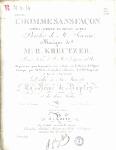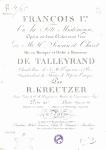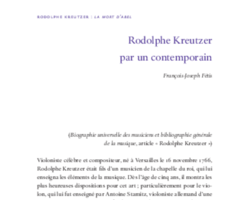
Rodolphe KREUTZER
1766 - 1831
Composer, Violinist
Born in Versailles, Kreutzer received violin lessons from his father, a violinist at the Chapelle Royale, and was then sent, in 1778, to study with Anton Stamitz in Paris. He made such good progress that, in 1780, he was able to perform a concerto of his own composition at the Concert Spirituel. Three years later, at the age of 17, he replaced his father at the court of Louis XVI. An accomplished virtuoso as well as a prolific composer, in 1790 he became solo violin at the Théâtre-Italien, where performances of his finest stage works, Jeanne d’Arc à Orléans (1790), then Paul et Virginie and Lodoïska (1791) were staged. Appointed professor of violin at the newly founded Paris Conservatoire (1795), a post he held until 1826, he actively contributed to the birth of the French school of violin playing, particularly as a result of the Conservatoire’s Méthode de violon, which he wrote with colleagues, Rode and Baillot (1803). At the same time, he began a long career at the Paris Opéra as solo violin (1801-1816), then as conductor (1816-1824) and finally as director (1824-1827). Although his forty or so operas and opéras comiques are largely forgotten—despite being beautifully crafted in a Pre-Romantic style in the tradition of Gluck and Beethoven—some of his instrumental pieces (including nineteen violin concertos, some concertante symphonies and the Quarante Études et Caprices pour violon) are still played. His name, however, will go down in history as a result of the tribute paid to his talent by Beethoven, who dedicated his famous Kreutzer Sonata to him in 1805.
Focus
Focus
Napoleon and music
Works
François Ier ou La Fête mystérieuse
René de CHAZET / Rodolphe KREUTZER / Charles-Augustin SEWRIN
1807







